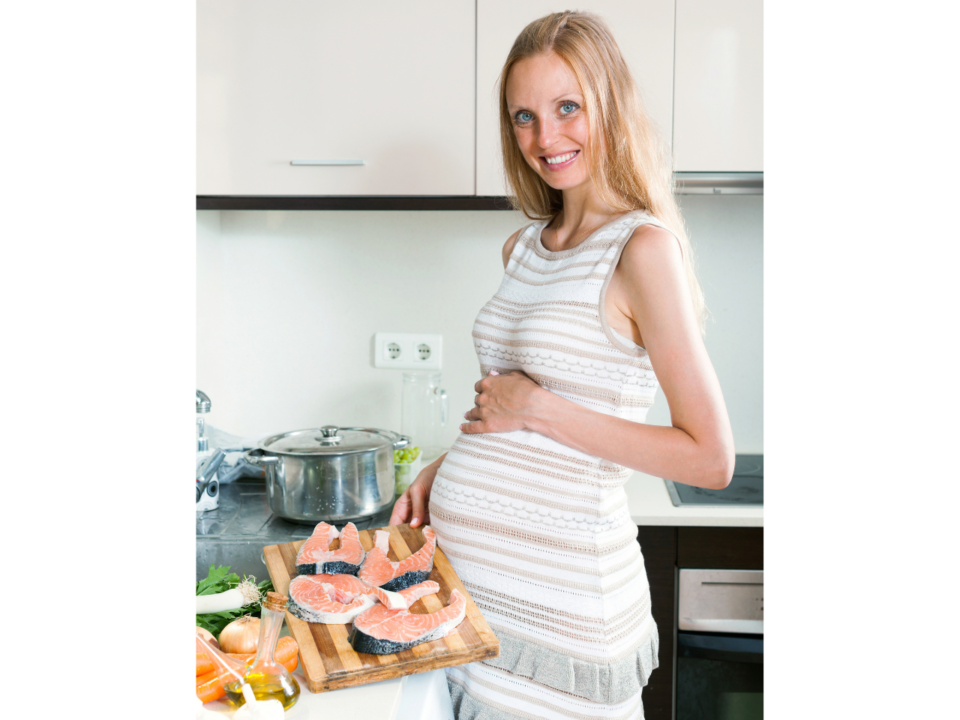Here in Louisiana, a large part of our diet and culture revolves around seafood. To every woman’s chagrin, we’re told to avoid eating seafood like delicious sushi. But what about our beloved crawfish and catfish? Michelle Landry, a registered dietitian at Woman’s Center for Wellness, helped us navigate the eats and don’t-eats of the infamous pregnancy diet.
Why did I get told to not eat seafood?
The warnings stem from food poisoning that could possibly affect your baby and the dangerous amount of mercury you might absorb if you eat fish with gleeful abandon, which will affect the development of your baby’s nervous system.
Mercury is found in large, predatory fish that tend to live very long lives. Just like how we absorb nutrients from our food, a predator fish that feasts on lots of smaller fish is going to absorb both the nourishment it needs and the traces of mercury within its meal. All of that mercury begins to build up in the predator fish that is eventually caught and served on your plate.
“Fish that should be avoided during pregnancy because of their high mercury levels include Shark, Swordfish, King mackerel, Tilefish, Bigeye tuna (found in sushi), Marlin, and Orange Roughy,” advises Landry.
Luckily, even if you are breastfeeding, you can enjoy raw fish after giving birth, so hold out for now. If you did eat raw sushi or seafood recently, there is no need to panic or rush to the hospital. The risk of getting you or your baby sick from eating raw seafood once is relatively low overall. If you begin to feel sick or exhibit flu-like symptoms, reach out to your doctor and explain what happened.
Okay, but I want sushi right now.
You’re in luck! Kind of. For the safest option, spring for sushi rolls that are fish-free or fully and thoroughly cooked. Since tempura and tempura rolls are made with fried shrimp, these are perfect options for those still wanting a taste of fish without feeling guilty. California rolls and cucumber rolls are also safe to eat and according to the American College of Obstetricians and Gynecology, since these rolls likely contain avocado as well, you’re getting plenty of folates which reduces the chance of developing neural tube defects.
For those of you who really enjoy seaweed, you’ve got this in the bag. Everything seaweed–including seaweed salad, seaweed in miso soup, and opting for a seaweed wrapping on sushi–is good to go.
Your main worry should be around fish sashimi, raw fish rolls, and anything containing smoked fish (unless the smoked fish is baked into a hot dish like a casserole) because the risk of contamination, and therefore food poisoning, is much higher with these types of dishes.
What’s safe to eat and how do I order it?
Beyond the threat of mercury, you also have to remember that raw, undercooked, or contaminated fish and meats contain bacteria and viruses. When ordering or cooking your own seafood, it should reach an internal temperature of 145 degrees, lose its translucent appearance, and flake easily.
Landry notes that most seafood contains some mercury, but it is generally safe to consume 2-3 servings a week of a variety of seafood that is low in mercury and high in Omega-3 fatty acids such as salmon, anchovies, herring, sardines, and pacific mackerel. Other safe choices include crawfish, shrimp, pollock, tilapia, cod, catfish, and canned tuna (limited to 4 cans per week).
Looks like our crawfish boils and evenings spent consuming bowl upon bowl of shrimp and crawfish étouffée are safe, ladies. Additionally, when properly cooked, crustaceans and shellfish such as lobster, crab, clams, oysters, and scallops are also safe and good options.
What is listeriosis, and how do I avoid it?
Unlike how we’re all more than willing to risk salmonella when devouring raw cookie dough, this is an illness you’re going to actually want to avoid contracting. Even more unfortunately, there are a lot of foods alongside seafood that you need to be cautious about.
“Listeriosis is a foodborne illness caused by Listeria. Listeria is a harmful bacteria that can be found in refrigerated, ready-to-eat foods such as seafood, meat, poultry, dairies like unpasteurized milk and milk products, and produce harvested from soil contaminated with Listeria. Make sure these products are fully cooked,” warns Landry.
Additionally, she cautions us to avoid refrigerated smoked seafood such as salmon or trout and hotdogs or deli meats unless they are reheated until steaming hot. Making sure every food you eat is thoroughly cooked to keep both yourself and your baby safe from the nasty side effects of foodborne illnesses.
Any other advice?
While you should exercise caution while eating, and, yes, there are some foods you won’t be able to get around avoiding, there is no need to be afraid of eating or lose your enjoyment of food out of fear. Eating is essential to the development of your baby and keeping yourself healthy and strong.
When in doubt, don’t be afraid to reach out for help. Your physician or another qualified health professional can answer specific questions and give you advice based on your own specific circumstances.
“Fish can be part of a healthy diet and provide key nutrients such as omega-3 fatty acids, iron, iodine, and choline during pregnancy and support a child’s brain development. Eat in moderation 2 or 3-4oz servings per week,” shares Landry.

